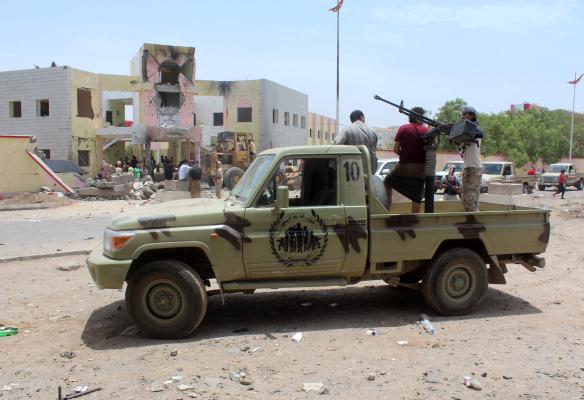ISIS has carried out another bloody suicide bombing in the city of Aden in which more than sixty fighters loyal to the legitimate government were killed. The bombing is part of a series of terrorist operations that is has carried out with its sister organisation Al-Qaeda there. The fighting illustrates the nature of alliances in the war in Yemen where the rebels, formed by the Houthis and those loyal to the ousted President Ali Abdullah Saleh, Al-Qaeda and ISIS are in one camp fighting against another camp formed of the legitimate government’s forces, tribes allied to the government and the Arab military coalition led by Saudi Arabia.
After the bloody attack in Aden, the Spokesman for the US State Department John Kirby said that “The attack underscores the urgency of a full and comprehensive settlement that will shrink the political and security vacuum that has been created by the civil war in Yemen”, and warned that “In the absence of a political solution, we remain concerned that ISIS and Al-Qaeda will continue to take advantage of the instability”.
There is no doubt that chaos nurtures terrorist groups and that a political solution is the best option for Yemen for all parties fighting there. Nonetheless, we must be cautious about giving into the Houthis and Saleh and handing over power to them, or allowing them to remain as an independent and influential power in any future agreement as this will be more dangerous.
Al-Qaeda and ISIS have been attacking the legitimate government in particular for the last two years. This is because the two terrorist groups have dealt with Saleh’s government and the Houthis in the past and continue to do so to this day. Even before the war, most Al-Qaeda operations targeting the United States and Europe were planned in Yemen, and were exposed and thwarted by Saudi security forces that have undertaken the task of pursuing the organisation during recent years.
During the last twelve months, the two terrorist organisations have mainly targeted Emirati and Saudi forces in Yemen and have tried to kill a number of Yemeni government officials in the provisional capital, including the former prime minister. Both of these terrorist organisations have played an influential role in obstructing coalition forces that are allied with the legitimate Yemeni government by systematically targeting it in areas liberated from Saleh and the Houthis.
There is an alliance between the terrorist groups and the rebels, and therefore the proposed reconciliation should not give Saleh and the Houthis considerable influence in the political project, otherwise it is certain that they will allow terrorists to target the legitimate government in order to weaken it and control the other pillars of the state after the proposed reconciliation.
Saleh did this in the nineties against his rivals within the unity government of the newly established republic of Yemen. He masterminded the assassination of dozens of leaders of southern Yemen and used Islamic extremists to do so. He repeatedly used Al-Qaeda over the past ten years, a matter which the Americans refused to believe until they obtained a large amount of information linking him to Al-Qaeda within the exploitation game which Saleh skilfully used to target his Yemeni opponents.
ISIS and Al-Qaeda knew that the Houthis and Saleh are the best allies for them in any future solution because those fighting terrorist groups in Yemen today are Saudi and Emirati forces, in addition to American forces that rely on drones.
The Saudis and Emiratis could have used the same tactic as Saleh and the Houthis, i.e. coming to an understanding with terrorist groups without objecting to them on the ground, leaving them to establish bases, recruit soldiers and train them at a time when the legitimate forces are devoting themselves to fighting Saleh and the Houthis.
Now, the State Department wants a peaceful solution because it is the best option. This is true but it must not come at the expense of the solution adopted by the United Nations which is based on holding elections, and not on the concept of the quota system which gives the Houthis and Saleh seats and greater influence just because they carry guns. The concept of the quota system which Iran promotes in Iraq and Lebanon ruined these countries and led to the chaos that we see there today. If the threat of Al-Qaeda and its sister organisations in Yemen is the main motive for US enthusiasm, they have to adopt the concept of one strong central state that will be able to fight terrorism tomorrow, instead of allowing the establishment of a militia state as is currently being proposed in the name of a reconciliation.
